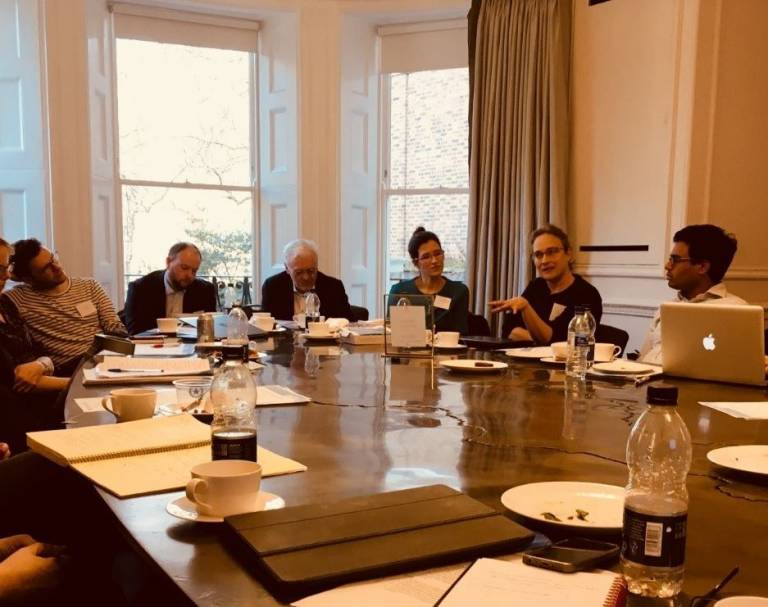Opinion: A Synthesis Study on Structural and Relational Inequalities
6 March 2019
UCL Public Policy and UCL’s Grand Challenge are delighted to be partnering with the Resolution Foundation to support an integrated and evidence-based approach which we hope can inform policy developments to address inequalities and help shape a more equal society.

Siobhan Morris - UCL Grand Challenge of Justice & Equality
More than fifty years after equality commissions were first established in the UK, there has recently been increased attention on issues of structural and relational inequality in society. Despite the demographic, socio-economic, and cultural transformations that have occurred over the last few decades, vast inequalities remain. Arguably, then, tackling inequality is the agenda item of our time.
Exploring Inequalities - igniting research to better inform UK policy, therefore seeks to cut across standard research and policy boundaries by bringing together a broad range of experts from academia, business, the charity sector, NGOs, and government to review, synthesise and deepen our understanding of inequality in the UK.
To do so, the study is intentionally broad in scope, addressing multiple and inter-related inequalities across four key policy areas: education; employment; health; and housing. Through a series of roundtables, the study will address the intersections and the relationships between different inequalities, i.e. how they relate to, reinforce, and overlap with one another.
Critically, the work will also seek out gaps in our collective knowledge that require filling in order to facilitate more joined-up, evidence-based policy decisions at all levels of government. Although not a formal commission nor a major research project, it is hoped multi-sector discussions will form the basis for agenda-setting and identify areas for further research with relevance for policy. The study will conclude in July, with a report summarising key findings and areas for further research to be published in autumn 2019.
The project is co-chaired by Professor Nick Gallent, a member of UCL’s Grand Challenge of Justice & Equality working group and Head of the Bartlett School of Planning at UCL, and Matthew Whittaker, Deputy Director of the Resolution Foundation.
Professor Gallent has noted, “Finding ways to close socio-economic inequality gaps in the UK is a hugely important challenge for us all. Our work with the Resolution Foundation is looking at what we know, and don’t know, about the cumulative impact of inequalities across multiple domains – education, health, housing and employment – with a view to highlighting areas for future collaborative research and action.”
Likewise, Matt Whittaker notes, “Inequality has been moving up the political agenda in recent years. Public concern about the issue is at the highest level recorded this century, and politicians across the spectrum – from Theresa May and her emphasis on the ‘burning injustice’ faced by many in modern Britain, to Jeremy Corbyn and his lamentation of the ‘grotesque inequality’ that afflicts many rich countries – have promised action. Yet policy responses too often fail to engage with the structural barriers that are embedded in our society and our institutions - barriers that underpin and perpetuate inequalities over individuals’ lifetimes and across generations.
Fixing this failing means developing a better understanding of how structural inequalities manifest themselves in different policy domains, and how they intersect and reinforce each other in order to create barriers that play out very differently for different groups. That’s where we hope our work with UCL can make a difference, bringing together researchers and policymakers working on different aspects of inequality in order to stimulate new thinking and help generate new approaches that deal directly with the root causes of inequality in the UK.”
Dr Olivia Stevenson, Head of UCL Public Policy, notes: “Debate on inequalities in UK society often masks the complex intersections of the factors that contribute to them. The changing world of work, differential educational attainment, barriers to entering the housing market, an ageing population and the fitness of the welfare state in the 21st century all represent major areas of intersectional inequity and provoke interlinked, generational policy challenges.
“UCL Public Policy and UCL’s Grand Challenge of Justice & Equality are delighted to be partnering with the Resolution Foundation to support an integrated and evidence-based approach which we hope can inform policy developments to address inequalities and help shape a more equal society.”
In sum, we hope the project will open up new thinking on critical inequalities, cut-through silos, and identify areas for further research and engagement with policy on an issue of such undoubted pressing societal concern.
> See more on Exploring Inequalities
 Close
Close

